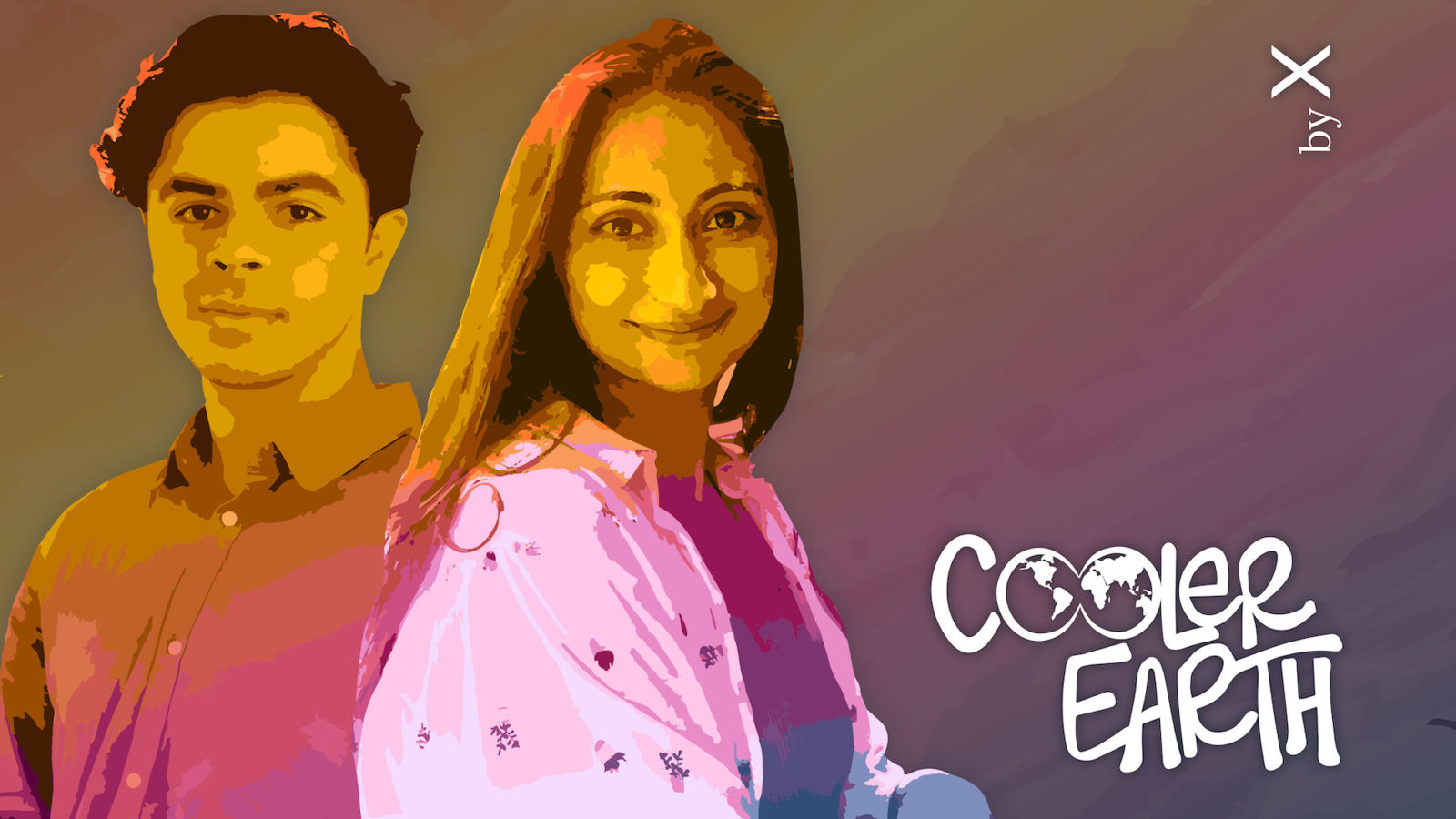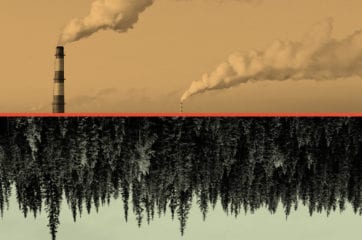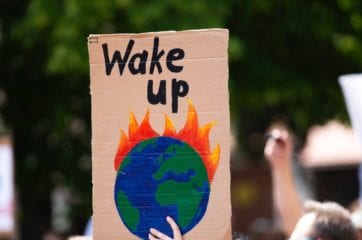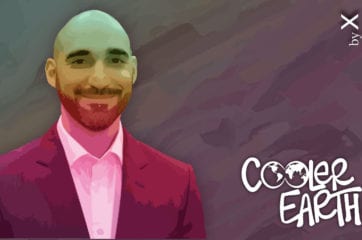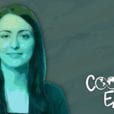Gabriela Rodriguez and John Paul Mejia, Co-hosts of the House on Fire Podcast
The youth climate and environmental justice movement has entirely reshaped the landscape of climate policy and changemaking. Young leaders from around the world have been central in not just leading mass mobilizations to demand action on climate and racial justice, but also in redirecting the public narratives and perceptions of the climate crisis and our roles in solving them.
Gabriela Rodriguez and John Paul Mejia are the co-hosts of House On Fire, a youth-led podcast powered by the CLEO institute. They are both Latinx activists, educators, and leaders for change in their community, who are leading the efforts to bring climate education to schools in Miami Dade, and are pushing elected officials and those in power to take serious, intersectional, and urgent action on climate justice issues. We talked about all things climate activism, radical imagination for a better future, and our shared Colombian heritage.
Below is a transcript of the podcast, edited and trimmed for clarity and brevity.

Maria Virginia Olano (MVO): I’m so excited to have you both on the podcast, thank you so much for making it work and taking the time!

John Paul Mejia (JPM): Of course, I’m happy to be here.

Gabriela Rodriguez (GR): Same here.

MVO: Where are you calling in from?

GR: I’m calling in from Miami, Florida

JPM: I’m actually calling in from New York City, but I live in Miami.

MVO: Awesome, pretty crazy weather in New York. I’ve seen a few videos and unfortunately those are becoming more common I feel.

JPM: I feel more crazy weather in Miami.

MVO: That’s true as well. I’ve been seeing footage from Colombia, that’s where I’m from, and friends and family in the Caribbean with the latest hurricane which is really scary.

JPM: Gabi and I also have family from Colombia.

GR: My family is from Bogota and Medellín, I have a hard time saying that city.

JPM: My mom is from Cali and my dad is from the coast, he’s from Barranquilla.

MVO: That’s so exciting! I was born and raised in Cali, and that’s where my family still is as well.

JPM: We’re all binded by that Colombian blood.

MVO: This is really exciting, this is the first time we have hosts of other podcasts on this podcast so I think it’s brilliant. Do we want to start with a little bit of intro’s and backgrounds — Gabi, maybe you start us off telling us about yourself and how you got to working on what you’re doing now?

GR: Thanks again for having us on, my name is Gabi Rodriguez. I like to consider myself a student, an educator, and an activist. Currently, I study environmental science and sustainability at Florida International University in Miami and I’ll be graduating next spring, so I’m very excited for that. I plan to pursue a graduate degree in climate science and solutions moving forward. I also like to consider myself an educator. I’m a program coordinator here at the CLEO Institute, where I help educate young people about climate change and activate them to take action, and I also co-host our show ‘House On Fire’ with JP, which is a podcast powered by CLEO. Lastly, I’m an activist as well and that’s weaved throughout all of my work everyday. I participate with local climate advocacy groups here in Miami.
JP and Gabby host their own podcast, powered by the CLEO institute, called “House On Fire.” Listen here.

MVO: Awesome. JP, do you want to tell us about yourself?

JPM: Much like what Gabi said, it’s hard to identify our work in any labels, but more than anything I would also consider myself an organizer, educator, and different things that fit in the midst of that as it relates to the climate crisis. I have worked with the CLEO Institute for a while now, and my role with CLEO now is the amazing House On Fire podcast with Gabi. But besides that, locally I serve as the founding hub coordinator of Sunrise Movement Miami where we participate in grassroots organizing for the frontline community that is Miami. Nationally, I recently joined organizers leading discussions on the Green New Deal and the future of it — I do spokes for the Green New Deal.
Learn more about the CLEO institute and their mission to provide education around climate science and motivating people to support climate action.

MVO: I’d love to hear a little more about the moment or thing that made each of you realize that the climate crisis was where you wanted to make your priority and focus your work.

GR: For me, I grew up always knowing that I wanted to be in and work with the environment. I was kind of always naturally attracted to being outdoors, so I decided to pursue an environmental degree in college. I was exploring different paths, whether it was law or policy or research, and I didn’t know what I wanted to do with my degrees. Then I was sitting in a class one time at my university, and it was at the end of the day, the end of the period, we just had five minutes left. The room was really dark, the seats were cold, but we had to wrap up the lecture and my professor decided to spend the last like four or five minutes introducing sea-level rise in Miami, Florida. He did this by projecting sea level rise slides — a map of Miami-Dade county — and with every slide you could see how with 2ft, 4ft, 6ft, more and more sea level rise will start to cover the land. So with every slide that he changed, I would see more and more blue essentially covering my county, my home where I live.
The Miami-Dade community is on the frontlines of the climate crisis. An earlier podcast episode delves into the importance of building climate leadership in the county and more broadly. Listen here.
I had definitely understood the climate crisis before and its implications, but seeing it projected like that to me really filled me with anxiety. It almost felt like I was drowning in that water that I was seeing rise. My chest got tight and then my lungs felt really filled and I just had instant climate anxiety in my college classroom. I was driving home after that class and I just kind of sat with that feeling and thought ‘I need to channel this into something.’ From that day, I decided to start getting involved with local climate advocacy and education, and I see that as my ‘aha’ moment that really catalyzed me into this work.
Navigating climate and eco-anxiety can be challenging, but you’re not alone. Learn more about climate anxiety and potential coping mechanisms here.

JPM: I also had sort of like a shocking epiphany in that way. I really started off with my work on climate I guess — well, my interest really started as a kid. I was a big science geek and loved nature, and I was always with my grandparents in Colombia exploring nature. But it really got to another level when I was in high school. My sophomore year, Hurricane Irma brewing in the Atlantic intensified to this catastrophic category 5 hurricane overnight. I didn’t know how to take that news — my home was right in its path. My mom and I went into our pantry, our closets and pack bags full of stuff and scurried off to a more affluent friend’s place for protection not knowing when or if we’ll come back. Thankfully the storm changed its trajectory, but nonetheless the damage was felt. When I started going back home, I realized it was a community already disadvantaged and under-resourced, and already fell to the existing oppression of racism and classism that were the most affected by the crisis that they had nothing to do with.
That’s when climate justice started making sense to me, and I understood that climate change wasn’t this environmental issue, but this culmination of all these issues that we’ve had as a society for centuries. That really woke me up and I realized that organizing for climate justice isn’t organizing for a single issue. Organizing for climate justice is organizing for racial justice, for economic justice, for indigenous rights, and that seemed like something purposeful for me to do. So I began organizing with a school walk out, then started reaching out to a bunch of groups — found CLEO, found Sunrise, and that’s how I am here today.

MVO: That’s amazing, and thank you both for sharing those personal stories. I feel similarly. It’s so crucial that this is not a science issue, this isn’t an environmental issue, it’s quite literally impacting everything else we care about. I was just yesterday watching the footage of the hurricanes devastating San Andrés and Providencia — which are two Colombian islands — and with my mom on the phone and her just crying. This is a place where we grew up going and visiting all the time. The reality that these are folks that are not responsible at all for the emissions and the causes of the problem are finding themselves on the frontlines of its impacts. It’s so hard and horrifying.
That brings me to something that I want to touch with both of you on and it’s this year, and everything that’s happened this year. From the pandemic disproportionately affecting Black, Latinx, and Native Americans, as well as the racial uprising and renewed calls for racial justice across the country and world, and also the economic recession that has also disproportionately impacted those who live with overlapping vulnerabilities already, I’d love to hear from both of you — how has this year, and everything we’ve seen happen, changed the way you either think about your work or you approach doing that work?

GR: I love this question so much, thank you for asking it because this is definitely the year that I’ve had the most change in my work — and not really just my work, but my purpose. Like I said earlier, I’m applying to grad programs to continue working on climate solutions and mobilizing people to take action on climate change, but you’ve got to be a little more specific than that when you’re picking your program and what you want to do. This year, with what you said, the multitude of crises we’ve experienced — the economic recession, COVID-19, the resurgence of the Black Lives Matter movement in the face of racism and police brutality — all of these things combined, as devastating as they are, show me on a personal level what I want to commit myself to.
In my work and my climate work, I want to specifically focus now on protecting and uplifting BIPOC communities — Black, Brown, and Indigenous groups — because if we’re going to tackle this issue with the limited time we have to pull it from the roots, we have to pull it from where the exploitation of people in the land have been. I truly find a lot of solutions and nature based solutions that are led by these groups, these BIPOC groups that are clearly just disproportionately affected by everything, not just the climate crisis. I think to answer your question, that’s what this year has put in perspective for me. I want to do my work solely for the protection of people and making sure we don’t make the same mistakes we’ve made again because this crisis exists, this pandemic exists, this economic recession exists, racism exists because of these theories of capitalism and colonialism from the beginning that need to end, so that’s that’s what I would say for sure.

JPM: Very similar to that, I guess it’s worth noting that 2020 has been one hell of a year. But the problem with that kind of thinking is that we recognize everything that’s happened in 2020, all of these spiraling crises, as this anomaly or rupture or unexpected thing that just happened and caught us off guard when it really is just a rupture of everything that we’ve been doing wrong for years. If we identify every spiraling crises of the moment as some sort of out of the blue thing that we can’t rationalize its origins from, we’re doomed. That’s exactly everything that happened this year in order to build a new world, essentially to build back better. Much like how Gabi said, long-standing theories of capitalism and white supremacy and colonialism really came up front this year when we were dealing with this pandemic. We have really witnessed how this collective existential crisis cannot be dealt with by telling people to pull themselves up by their bootstraps, by shrouding them with rugged individualism and leaving them to despair and fend for themselves against the crisis. No, we did something very different. Countries and places who handle this crisis best put it at the top of their priority and they mobilized every national sector to deal with this crisis at the urgency that it demanded and that saved lives.
When we talked about the climate crisis does this ring true as well? Absolutely, and perhaps even to a higher priority. Why? Not because I have bias saying that the climate crisis is more important than the coronavirus crisis, but because we can expect several of the same effects that we have been dealing with this pandemic that we can deal with with the climate crisis as well. It’s worth ditching our theories that have rationalized treating some people as disposable versus others not, and rugged individualism for those who are dying, and instead opt for solutions that are collective and that will drive for the betterment of humanity and our survival on this planet.

MVO: I could have never said that better, JP, so thank you for what you just articulated so well. I love also that you pointed out the irony in us collectively looking at 2020 and saying it is, exactly, ‘an anomaly.’ This unprecedented hurricane season, the unprecedented wildfires, and this virus that came out of nowhere — that’s not the reality. Folks who understand systems thinking and everything going on leading up to this point understand that this isn’t a one-off year in which awful things happen, but in fact a continuation of ongoing crises that are plaguing us.
What are some of the obstacles you still see, whether in your communities or in the world at large, that are preventing us from having an even higher understanding of where we’re at and what we need to do to keep this planet livable, and ensure equity in the process?

GR: It’s pretty ironic that you just asked me that question because I had to answer a very similar question for an assignment the other day. I was asked ‘what are the two obstacles that you find are most in the face of the climate crisis?’ I think it’s such a complex answer, but I’ll say what is in my head as the two biggest things that need to be worked on and gotten rid of. The first one is definitely the hands of the fossil fuel industry in our policies and in the way that our systems work. We need to completely dismantle the fossil fuel industry and everything about it that is wrong and doesn’t care about the people and the living things on this planet. That might mean voting in people who are not tied to the fossil fuel industry and are not tied to corporate lobbyists. That means being civically engaged and demanding action from local and national governments. And then the other obstacle I see is definitely more on an individual basis, but at the same time as going to need systemic and more broad efforts. I really find the misinformation and greenwashing campaigns that have existed in the past few decades to be absolutely detrimental to the work that we do today. I think we’re going to deal with those effects for a long time.
What I’m referring to is the misinformation that has been spewed by fossil fuels for decades to protect their profits, the greenwashing campaigns we see everyday from large corporations and billionaires who promise they can help save the planet and its people. I really think that is an obstacle because it leads the greater public to feel safe in their hands and employ what I like to call ‘magical thinking,’ where future technologies and billionaires will save us from this crisis. No, they won’t. It’s going to be people power. What I’m trying to get at is, in addition to dismantling the fossil fuel industry and giving the energy grid back to the people, another obstacle is dismantling the misinformation and the learning that has gone into the general public thinking that the climate crisis is not real, not important, or someone else will save it. That complacency needs to end, and that is a huge part of what JP and I do and the efforts that we carry through the local community.
Fossil fuels have a long history of suppressing climate science and launching massive misinformation campaigns. But now, many states are taking legal action against these companies, citing false and misleading advertising from fossil fuel corporations infringes on consumer rights. Read more.

JPM: When we talk about climate, we talk about the interwoven structures that uphold it as racism, capitalism, and colonialism, but what is the upholstery, what is buttressing the crisis. Right now, knowing that California is burning, places are going underwater, that hurricanes are wiping out entire communities, how do we still not recognize that this is a crisis? Two threats for example, the first being neoliberalism, which has really dominated the globe since at least the ‘80s — we’ve been operating off this for decades now. In this book, Naomi Klein more specifically calls it market fundamentalism. It’s this belief that the market will solve everything and it is worthwhile for common people to sacrifice their own material needs for the betterment of a market that won’t even work for them. When we talk about that market, we’re not talking about some random esoteric thing. We’re talking about this apparatus that is in the hands, and serves as a tool, for a small group of people — many of which are in the fossil fuel industry— that are ready to put their own livelihoods, profits, and luxuries above the mere existence of life on Earth.
They use that tool in many different ways to distract the public from its own benefits, one way, like Gabi said, is misinformation and greenwashing. Another way is to pay off politicians on both sides of the aisle to opt out for anything that will serve their constituents. We know about the good ol’ climate deniers in Congress, I don’t need to speak about them. But, we also don’t criticize the politicians who might believe in climate change, but don’t really do anything. On that other note, this crisis of incrementalism, this sort of delusional belief that this crisis that presents itself with such a short timescale and such high urgency can be dealt with one chip at a time. Incrementalism is another form of denialism, and it’s time it stops being tolerated.

MVO: You’ve hit on another aspect that I definitely wanted to get in with both of you about, which is the role of elected officials and public policy, and how changing structures of power and public discourse is giving us back some of the power to be able to inform power and decision making. What I’m talking about specifically is the massive role of young activists, like yourselves, and Sunrise and the other brilliant folks working in this space that really pushed the conversation forward this past presidential election. We saw climate front and center in a way we’ve never seen before. By the end of the Democratic primaries, there wasn’t a candidate who wasn’t talking about environmental justice within their climate plans. That’s really reflective of activists and movement builders who made that happen. At the same time, we found ourselves on the other side of the election that left a lot to be desired.
I’d love to hear from both of you, as residents of Miami and Latino’s, which are two things that were really huge in this election, to tell me how you’re thinking about electoral politics? Obviously understanding that’s not the end all be all of climate and changemaking, but how does that factor into how you think about change and the immediate things we need to get done, while at the same time dealing with antiquated systems that keep power of the few and is not representative of the priorities of the people?

GR: Reflecting on, for example, Biden’s win. When looking at elected officials and electoral politics in general, I think that it’s a vehicle for what we want to happen but I really don’t think that it is, like you said, a solution, it’s not a promise. It’s something where this will only work if we stay engaged as young people. For me, as somebody that lives in Miami, is a young person, is a Latino person, is faced by the climate crisis, cares about immigration, cares about human rights, all of these things, this past election I voted with my values. I voted for at least some piece of human decency and somehow preserve our supposed democracy. The sad part is that, when it comes to politics in general and voting for elected officials, you really have to campaign and support people you know you can work with. At the end of the day, I think it’s important to remember that as people in the U.S., those elected officials work for us and they represent us and our needs. Voting is not the end of doing the work as people — we have to go beyond that, we have to hold these people accountable, these people in office should be really reaching out to us regularly to address our needs. That’s where my headspace is right now about this, and I think that the key message and what we’ve seen in the last two weeks is that it doesn’t end here. Taking this election as an example, it was not the finish line at all, it was actually the starting point. The next four years, or however long we work with this administration, is really going to be the time we have to tackle the climate crisis and all the issues we care about as human beings on this planet.

JPM: Absolutely, and I think it’s brilliant that you brought up the example of Biden and Sunrise as well because that’s sort of this example of how these dual forms of power can work. We organize our communities and organize the electoral scene. I work with Sunrise Movement as well and I know that we did not give Biden an easy time at all during the primaries. We embarrassed his climate plan, giving it an F minus. We protested against him many times, but he was what we were left with. We didn’t sort of accept this range of defeat after the primaries, after not having our endorsed candidate go through. We didn’t give up and we said okay well it’s still our duty as a movement to galvanize climate action.
So what we did was ramped up the pressure way more and we created this rift in which young people, progressives, and predominantly people of color were asking for bold solutions that weren’t being met and drove in this point that votes aren’t just given, they’re earned. For that reason, the Biden campaign invited some leadership from the Sunrise Movement, its executive director Varshini, to come onto a Senator Bernie Sanders and Biden Unity Task Force to rewrite this climate plan to fit closely to the bold vision of an actual Green New Deal. The pressure that was amounted for him to do that is what created Biden’s climate plan now and what catapulted him to win in the first place because fun fact, after our convention and rewriting of the plan Biden’s climate plan was actually more popular amongst people and Biden himself. It’s really interesting to see how wielding people power in those ways can create massive change. Now great, Biden’s elected, are we going to go back to brunch? Hell no. He’s put some people who have worked in the fossil fuel industry before on his transition team. Do we take that lightly? No, not at all. We’re mad as hell about it. We picked our cabinet recommendations and we’re going to hold him through on that. That really drives home the point that work never stops, especially under electoral politics, but we can’t blind ourselves with the illusion that one politician or a group of people who represent us are going to save us — no. Like Gabi said, they’re our employees. We have the power to mobilize entire communities to build up enough pressure to change the decision that these folks make by making our demands incapable of ignoring.
To your point about Latino communities and the one we live in for example, it’s important to not treat these communities like a monolith. One of the things that we see is that political opinions in the Latinx community are incredibly diverse. For example, in the primary season, we had folks in Nevada and other states from Central America gravitating towards Bernie Sanders, versus some of Miami’s Cuban and Venezualen populations centered more around the GOP. Being able to connect these folks on what their wishes are is much more informative than you might think, because a lot of things these folks have in common is a deep disdain for elitism and neoliberalism. Joe Biden didn’t come out in shining colors with the Latino vote, Bernie and Trump did — why? Well, for a lot of people, they feel angered by the political system under which we live. An escape from that is seen through a candidate who is against the establishment — what kind of candidate will that be? That’s where the opinion diverges. But, the important part is connecting with our communities to make sure that rhetoric of violence and hatred isn’t capitalized on by fear, and that we can create coalitions with our Latinx, Black, and Indigenous brothers, sisters, and siblings to truly flip the page on the type of world that we want to build — a multi-racial democracy that will end the climate crisis.

GR: I just want to add that I agree with everything JP just said. Going back to a few minutes ago when we talked about going beyond the ballot and going beyond your vote, there’s a quote from a Sunrise video recently that I wrote down on my phone because I found it so impactful and something I want everybody to really remember moving forward — not just for the end of 2020 or the beginning of 2021 when Biden kicks in — but literally for however long our democracy is around. It’s so crucial that we stay engaged, and the line goes: ‘Your vote was an invitation to power, and now it’s time for you to throw your power around.’ I just thought that rings so true, and now is the starting line and this is when people need to be most engaged, and stay so moving forward to the best of their abilities.

MVO: Absolutely, and I’m so excited right now because, like you both said, the work only continues and the possibilities of that work are only broadening with a new administration, but that doesn’t mean that priorities have changed. I was actually reading an analysis last week about how Donald Trump might have actually catalyzed people to care about the climate crisis in insurmountable numbers because they saw the threat so near. And there is perhaps this fear that now with a changing administration a lot of folks are going to go back to feeling okay or safe or complacent because the “threat” is out of the White House. In reality, that’s not how any of this works.
What are some of the opportunities or the parts of this work or specific climate solutions you’re most excited about right now?
“Did Trump scare Americans into caring about climate change?” Read the analysis here.

GR: I’m so excited about everything just because we’ve said a million times that the Biden administration is not a fix all solution. It’s going to take all of us working together to get some type of national, cohesive, bold action and policy in. For me, as I stated earlier, the most important thing and what excites me the most is communities of color and under resourced communities — communities that have often been ignored and excluded — actually receive the protection, resources, uplifting, and leadership they need. We see that that is definitely an opportunity with Biden’s upcoming plan centering environmental justice, and not just Biden but more and more elected officials around the country and locally as well focusing on this. We haven’t mentioned this yet, but our new mayor is going to be Daniella Levine Cava and she’s the first woman mayor of Miami-Dade county, and she cares about the environment and understands the climate crisis. As a young person living in Miami, seeing her elected — again, we don’t want to worship or idolize any political canidates — but seeing her elected gave me so much hope for my county and action on a local level, and the opportunity that come with protecting our Black and Brown communities suffering climate gentrification and all the future issues that can arise with that. There is a lot of opportunity, and I’m excited to see it the most in those who need it the most.

JPM: That answer got me riled up. Sometimes I’m a bit of a policy geek and it’s super interesting to see how stuff has shifted over the past couple months. When we talk about Biden right now, what we’re seeing or what we’ve seen is bolder promises and policy. Nearly $2 trillion of investment, almost 40% of those in climate and 40% going to the most vulnerable communities that have historically left behind, pushing the electrified renewable sector like 15 years more ambitious to 2035 net-zer0 — I mean, there’s so much we can really hope for, but there’s so much more to push for. We can’t look at these things and say the problem is fixed — no! We have an entire system that has to change. I’m really excited to see things like the returning of land to Indigenous people and Indigenous sovereignty over stolen land; I’m excited to see community ownership over energy and the goods and products produced from the clean energy revolution; I’m excited to see how we can center communities left behind historically in the decision process in creating a new world; I’m excited to see us alleviate from such an economic downfall where people are struggling to get by every day by the creation of millions of jobs that are more dignified, unified, better paying, and will help restore and stabilize our climate. There’s so much that we can imagine and that we can do that’s not on the table yet that we have to keep pushing for. It’s not only us imagining this utopia, when we imagine these things we’re talking about what we need. We have operated in the realm of cynicism for so long thinking that okay, maybe it can only get this good before it goes to crap again. No! Now is a time where we’ve been through the worst these past five months and we know that entire countries have been able to mobilize to crazy extents in the past, due to war and other existential crises — this is our moment to truly flip the page on what it means to be civilized and create a future in which your very existence isn’t politicized.
Biden’s climate plan is the most ambitious of any U.S. president-elect. Read our breakdown of how the plan aims to tackle climate action at the federal level. Read more.

GR: I want to add onto your spiel of things you’re excited to see. I am so excited to see people that are just engaging with the movements, and when I say movements I don’t specifically mean the climate movement, but the movement of people and rights and systems that are not oppressive. That is what excites me in this moment as we speak. Earlier this year, when the COVID-19 pandemic started, someone had asked me ‘do you feel like the COVID-19 pandemic has stalled climate work or deterred the climate movement?’ I approached that from a broader sense — yes, technically the pandemic has made mobilizing more difficult and we can’t do regular events for education. But my answer was no. If anything, the pandemic — and I don’t mean to demean the suffering that has come from the pandemic — has shown a lot of people what is so wrong about the oppressive systems that we live under, that JP is talking about, and has helped mobilize so many people, young and old, Black and White, very different people all around the world to further understand what we’ve been doing wrong for centuries. That is something that I’m incredibly excited about not just in the future, but right now.

MVO: It’s been brilliant to produce this season of the podcast during this time because it has weaved through, exactly what you’re saying, with fixers and climate leaders how this year has impacted them. And frankly, across the board everyone’s answer is this is a massive opportunity, an opportunity for collective change and a mobilizing of people who would otherwise not be entering this movement in such a way.
JP, I want to highlight something that you said that I think about so often and that is the role of imagination. You said we can imagine, and that’s a huge part of the work really because we get to really use our creativity and communities to reimagine how these systems can better serve us. It’s kind of ironic because if you think about it on the other end, there have been people who have imagined and created these systems of oppression who uphold white supremacy and late-term capitalism in the ways that we see them. To see us now saying no, we also have the potential to imagine and make true these things that we envision and see.
Through this conversation, the web we’ve weaved is the role of young people in the election and in general, in changing the public discourse and conversation. I would love to hear from both of you, personally, how this journey has manifested for you in your lives with your family, your peers, your school, and this role in taking on the most critical and existential crisis of our times — which I know isn’t easy and isn’t always met with the kindness and the importance it deserves.

GR: I think I’m pretty lucky because, for me personally, I’m in a bubble of very supportive friends and families that are supportive of the work I do — they get it, they understand the climate crisis. But, I would say that there are definitely people in my life who are more activated than others and for me, and what I’ve noticed with my work, is that I’ve been able to activate people in my life who didn’t care about the issue beforehand. Something else I’ll add is that, I’ve noticed in doing this work oftentimes, as an activist, an educator, a student, you become perceived as the “climate person” in the room — which I know JP can relate with. This is the part of my answer that I’ll say is a little discouraging, that’s not as nice, because when that becomes a label, your work feels quite demeaned. And it feels like ‘no, you don’t understand. I’m not the climate person in the room because this is all for fun, this is my hobby and this is my passion, no. This is because it’s for the survival of this planet and my future and everything I envision for myself — everything’s at stake, I have to do this.’ I think that that is something that most, if not all, people who work in this can understand that the label sometimes is quite annoying because I’d rather have people say ‘Tell me more about what you do? How can I get involved? What are my abilities?’ That’s where my head went with that answer, but that’s something I wanted to bring up as well because oftentimes we get that feeling from other people. I want people to understand that this isn’t a label or hobby, this is something that you should be tuned into as well because it’s going to impact your life as well.

JPM: I agree with Gabi 100%. In a way, it becomes a personality trait in good and bad ways, but what sucks from it is those distasteful conversations where someone will come up to you and say ‘Ohh yeah, you’re into the whole environment thing.’ It’s like, yeah, being interested in my own survival is super trendy. There’s lots of ways activism forms, but there’s a certain sense of anxiety that I feel with climate that is unparalleled to different issues. There isn’t one day that I don’t think about deadlines and impending destruction, and the remedy to that is the amazing people with whom I work and the fact that we all work from a place of optimism over fear that really keeps me going. But, there are several discouraging parts of activism I guess just like everything else.
One more thing is that in leadership and tough leadership positions, it’s hard because it’s not a crisis we were prepped to deal with. No one wrote a book about how to be a climate activist. You’re talking about huge issues and huge powerful statutes up against you, and trying to fit into what everyone else wants you to be is so hard as it is, add another crazy identification of what you’re trying to do on top of it and it’s even worse. But it makes your skin thicker and it’s totally worth it because at the end of the day, under this god forsaken system that we live under, the careers and workplaces we often find ourselves in, we don’t find purpose in them. But the work that I do, I’m privileged enough to find purpose in, and I’m really grateful and fortunate for that. And I want to build a world where everyone can find their work purpose as well.

MVO: Everything both of you are saying is so resonant. I’ve certainly sat in rooms in which people have said ‘Oh, you’re so passionate. You’re just working on what is your passion.’ And it reminds me of something I read once where it was a cartoon that said ‘Telling someone they’re ‘passionate’ about the climate crisis is like seeing someone drowning and telling them you’re so passionate about swimming.” It’s just unreal to think about people still thinking about this as an abstract, esoteric concept that is somewhere else, when it is quite literally about survival — and not of our children or grandchildren, but us right now in this moment. I think a lot of people are going to resonate with what you both have shared. I also want to touch on, JP, something you said about the difficulty and the immensity of this work being put on a few folks and how challenging that can be. I know you mentioned that one of the things that keep you going is the people that you’re fortunate enough to work with, but is there anything else you both find grounds you at the end of very difficult days or weeks, or moments of self-doubt or doubt in this movement or the possibilities, that keeps you coming back to this work in a way that is sustainable for yourself?

GR: I’d say the main thing, like we said earlier, is the people and being surrounded by emotionally intelligent people, but I don’t want to add to that because we already spoke about it. I would say the other thing is the wins, the successes of the movements. Those are the things that you’re like wow this effort I’m putting in is amounting to something. I think I really felt that — I hadn’t felt that in a long time frankly — until the presidential election and after the work we did for voter mobilization. For a while this year, I hadn’t felt a big win, but when I did in that moment and I also saw that we elected a mayor that cares about the climate crisis, it re-sparked that energy in me. But there are also smaller wins that keep you going throughout the week, and days and moments. For me, those smaller wins are something like seeing my friend join a meeting for a climate advocacy group I’m in. Seeing one of my parents make the connection to the weather they’re seeing on the news to the climate crisis. Seeing somebody I know vote for the first time in a local election and understanding how local politics affects them. I’d say that for me it’s the small and big wins, and ultimately, you’ll still feel tired and it’ll feel unfair to be doing this as a young person. That’s where the attention to self-care comes into play and making sure that you’re okay with taking time off if you need to. I feel like growing up in the U.S., or really any capitalist system, is that you feel like productivity is what defines you and you’re nothing without being productive. I think that’s really toxic and really unhealthy, and that’s where the aspect of understanding that rest is important, joy is important, and I find those things to be more important than productivity. Rest and joy are not only important for your health, but they’re forms of resistance as well to the world we live under.

JPM: I really resonate with everything Gabi said, I won’t repeat any of it. The other point I’ll add is that, on the people aspect and the people who you work with, I love partaking in reading movement history and making key insights to how to organize. Bringing those thoughts to a table of people and asking ourselves big questions like ‘what is the future of climate convection going to be for the entire U.S.? What’s the future of the largest climate policy we’ve ever put on the table going to look like?’ Actually executing those conversations and seeing entire paradigms around an entire discord that has existed for decades now change within months is so crazy in the best ways possible. To think you’re part of the movement doing that is awe inspiring. It’s the realization of what it means to leverage power that is really grounding and does keep you going, because suddenly what’s been in your head is actualized and realized right in front of you and you can keep going. I find that incredibly grounding.

MVO: In the last minutes we have together, I’d love to hear from both of you. If we are successful, if we succeed in reshaping and reimagining the world into what we know it should be —what does that world look like for each of you?

GR: I could go on for hours describing that world. For me, that world looks like a world where we don’t deal with these systems we’ve talked about for the past hour, where people feel that they’re not under a system that hates them or systematically oppressing them. Where Black, Brown, Indigenous, all sorts of people — queer people, trans people — everybody can come out and really rejoice in their community together and feel that their community is there for them. And also, a world where not only people are protected, but our air, our water, our atmosphere, our species, our natural process — I could go on — all those are protected as well. Not only protected, but built back better than they were before. Not only resilient, but able to grow better than before. I envision a very regenerative world, where everything is treated as it should be. A lot of that goes back to a world we might have seen centuries before, a world that me and JP and you don’t even know, a world before colonization. A world where Indgienous people tended to the land and cared for it and that’s honestly a world that might not look exactly the same because we live in a different time now and different technologies and science, but a world with the same values and principles.

JPM: There’s so much to imagine. I envision a world where we stop being so scared of each other, our identity, our skin color, our labels of national identity. I envision a world in which people are placed over profit. I envision a world where no one is disposable. I envision a world where we’re able to tap into a full potential of humanity. I believe in a world in which we don’t feel like we’re competing with each other. I believe in a world in which we feel purposeful about our work. I believe in a world where we have direct ownership over the things we love. I have envisioned a world in which we are able to rise above the hatred and fear of the past to pursue a collective future together. I see a world in which solidarity is what defines what it means to be human. I see a world in which we treat people and lands as the living organisms that they are. I believe in a world fueled by reciprocity for each other, in which we don’t have to implore the lives of other people to benefit our own, in which we’re able to communicate, operate, work, live, exist with each other rid of so much oppression and hate that clouds and spectors over everything now. There is really a lot to imagine and there are huge goals to strive for, nonetheless the question of human nature is obsolete. We know we can get there, but it’s going to take a lot of work.

MVO: Here’s to that work and to that future and everyone working so hard to make it a reality. Gabi, JP, you both are such a gift to this movement and I’m so grateful to have spent this time with you today.

